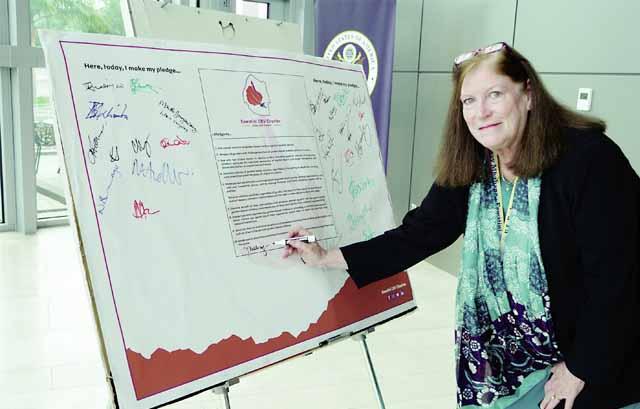Africa-Press – Eswatini. US Ambassador to Eswatini Jeanne Maloney has encouraged members of embassy community to sign the Eswatini Charter to end Gender Based Violence.
The ambassador said this during an engagement with Kwakha Indvodza at the Embassy on Friday.
She noted that gender-based violence (GBV) was one of the most prevalent human rights abuse not just in Eswatini but in the world. She explained that Eswatini GBV Charter was a national initiative by Emaswati for Emaswati to make a lifelong pledge to end GBV within every sphere of their lives.
She also noted that Eswatini had made great strides in the fight against GBV when the SODV Act was enacted into law; a momentous occasion that the embassy community had supported in various forms.
“This legislative win moved the needle in the right direction. There is more that still needs to be done, more practical steps to ensure gender equity in Eswatini and the Eswatini GBV Charter is a crucial part of the next steps towards this goal.
It is a hugely important tool to take action against the rising tide of GBV. Every line of this pledge describes a way each of us can personally commit to ending GBV. We all have a role to play in ending GBV, by seeing it, calling it out, and declaring violence unacceptable in all its forms,” she said.
She added that this was an opportunity for the embassy community to raise their voices against the devastating effects of GBV in the country and recommit to the movement #EndGBV together.
She added that it was also an opportunity to think through and consider the pledge that would allow people to reflect on how each one has a role to play in the fight for gender equality.
Maloney added that it also afforded the opportunity to recalibrate efforts and ignite new momentum for positive advancement in policy and social norms related to the scourge of GBV.
She said the charter addressed an issue of vital importance to Emaswati women and communities.
As Eswatini is poised for what we hope will be an inclusive, productive and consequential national dialogue, she said, it was more important now than ever to ensure that all Emaswati have a voice that is not subdued by violence of any kind.
“Today the US Embassy is raising its voice and adding it to the chorus of voices that believe that GBV is not acceptable, ever. We work every day to break down barriers to women’s equality, counter negative gender stereotypes and chip away at social norms that block women from participating in social, economic, and leadership activities.
“I am proud of this document and I am equally proud that today the US Embassy is among the first organisations to embrace the charter and share it with our staff,” she said.
Further, Maloney said she hoped this would also pave way for others to do the same. She encouraged other organisations, institutions, and employers to do likewise, and bring this charter to their members and employees.
She said she was encouraged to see so many people learning about the harter. Maloney added that the US Embassy was also pleased to work with Kwakha Indvodza on many other projects that address gender-based violence, empower women and girls, and help correct the power imbalance that feeds cycles of abuse and violence.
She said this was part of their deep commitment to help form a healthy Eswatini that values healing, inclusivity and human rights.
Moreover, the ambassador said everyone had a role to play in building a safer, more equitable and inclusive future for the next generation.
“To all our staff, thank you for being open to embracing this personal pledge. To Kwakha Indvodza, thank you for reminding us of the vital importance of gender equity and for bringing continued energy to the fight for gender equality for the benefit of all Emaswati,” she said.
Giving a background, she said a year ago, the Department of State reinforced the need for inclusion principles in their organisation, and to reflect on their values in the foreign policy work at missions.
The ambassador said as part of that effort, all US missions were encouraged to form diversity, equity, inclusion, and accessibility (DEIA) Councils.
“We also recognise in our foreign policy work that equity and inclusion are force multipliers for peace, security and prosperity. Equity and inclusion are also fundamental components of human rights. This is the context for today’s discussion,” stated the ambassador.
Meanwhile, Kwakha Indvodza Advocacy and Communications Coordinator Sakhile Shabangu emphasised that no one was forced to sign the Charter. He said it was a personal decision and a personal commitment.
“No one is coming to save us as Emaswati but we have to save ourselves. Every Liswati has a role to play. This begins with the way we raise our children. If children grow up in hostile environments because a child observes behavior, at some point the child will exhibit the hostile behaviour,” he said.
For More News And Analysis About Eswatini Follow Africa-Press







